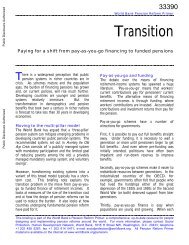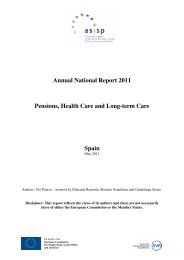Financial Sector Development in Africa: Opportunities ... - World Bank
Financial Sector Development in Africa: Opportunities ... - World Bank
Financial Sector Development in Africa: Opportunities ... - World Bank
You also want an ePaper? Increase the reach of your titles
YUMPU automatically turns print PDFs into web optimized ePapers that Google loves.
The Potential of Pro-Market Activism for F<strong>in</strong>ance <strong>in</strong> <strong>Africa</strong>: A Political Economy Perspective 183<br />
light on how market failures can make provid<strong>in</strong>g credit to SMEs prohibitively<br />
costly and less profitable than the alternative options of commercial<br />
banks, such as those serv<strong>in</strong>g large corporations or governments.<br />
Asymmetric <strong>in</strong>formation (especially adverse selection and moral hazard)<br />
and enforcement problems add substantially to the transaction costs<br />
for lenders. Because of such market failures, lenders need to spend<br />
resources to screen and assess the creditworth<strong>in</strong>ess of borrowers and<br />
monitor them. In poor countries, these costs are particularly high because<br />
SMEs often lack a credit history or formal and stable sources of revenue<br />
or assets that can be used as collateral.<br />
Moreover, private banks may not f<strong>in</strong>d it worthwhile to <strong>in</strong>cur the high<br />
costs of screen<strong>in</strong>g and monitor<strong>in</strong>g SMEs because once these borrowers<br />
have a good credit history, they can obta<strong>in</strong> credit from other lenders who<br />
will not have to bear the <strong>in</strong>itial costs for screen<strong>in</strong>g. This suggests that<br />
<strong>in</strong>formation on creditworth<strong>in</strong>ess is basically a public good, <strong>in</strong> the sense<br />
that once it has been generated, it is very costly to exclude anyone from<br />
us<strong>in</strong>g it. When the market fails to let banks appropriate the returns of<br />
<strong>in</strong>formation about their costumers, banks will under<strong>in</strong>vest <strong>in</strong> the acquisition<br />
of such <strong>in</strong>formation. 5<br />
Besides asymmetric <strong>in</strong>formation, enforcement problems, and the public<br />
good character of borrower <strong>in</strong>formation, high m<strong>in</strong>imum efficient<br />
scales <strong>in</strong> the provision of f<strong>in</strong>ancial services may impede the function<strong>in</strong>g<br />
of credit markets. Credit, like the provision of other f<strong>in</strong>ancial services,<br />
<strong>in</strong>volves fixed costs and, to a certa<strong>in</strong> extent, <strong>in</strong>creas<strong>in</strong>g returns to scale. If<br />
f<strong>in</strong>ancial markets are small, as <strong>in</strong> most <strong>Africa</strong>n countries, the lack of<br />
economies of scale substantially adds to the unit costs of transactions.<br />
Low population densities exacerbate this problem. Moreover, high m<strong>in</strong>imum<br />
efficient scales <strong>in</strong>crease market concentration, which eventually—<br />
although not necessarily—reduces competition and <strong>in</strong>creases prices. 6<br />
High costs for provid<strong>in</strong>g credit that have a negative effect on profits<br />
should be an <strong>in</strong>centive to <strong>in</strong>novate and f<strong>in</strong>d less expensive ways of provid<strong>in</strong>g<br />
credit. Yet market failures reduce <strong>in</strong>vestments <strong>in</strong> credit market <strong>in</strong>novations<br />
to a po<strong>in</strong>t below what is socially optimal: <strong>in</strong>novations are a public<br />
good and therefore <strong>in</strong>novators bear all the costs <strong>in</strong> case of failure, but they<br />
f<strong>in</strong>d it difficult to prevent other <strong>in</strong>vestors from adopt<strong>in</strong>g the new technology<br />
once it has proven to be successful. Without the chance to <strong>in</strong>ternalize<br />
more of the positive externalities they create, the <strong>in</strong>centive for private<br />
banks to <strong>in</strong>vest <strong>in</strong> socially profitable but f<strong>in</strong>ancially relatively unattractive<br />
<strong>in</strong>novations will rema<strong>in</strong> low. This holds <strong>in</strong> particular where markets are<br />
uncompetitive and easy outside options are available.







